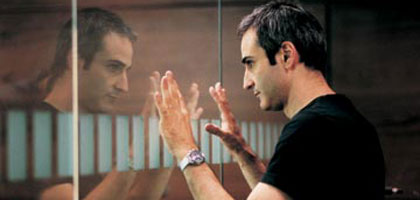
Olivier Assayas Power Games

The director talks to David Thompson about S&M, capitalism and why Don DeLillo matters.
David Thompson: Demonlover appears to be a strong reaction to your previous films.
Olivier Assayas: Les Destinées sentimentales was part of my life for eight years and once I had a sense of being free from it, it seemed a good time to question every aspect of film narrative, to step into uncharted territory.
The strongest influence was reading Don DeLillo, whom I discovered at this time. I felt his work was completely relevant to me in terms of interconnecting things which should not interconnect, creating new paths for contemporary fiction. I felt he was so much smarter and deeper and more powerful than anything I saw within the framework of movie narrative, and he has been a huge influence on modern American cinema. The climate in France for fiction cinema has become incredibly reactionary. So this was the right time to take chances.
I just started writing and somehow the characters took shape really quickly in a rough form, and I was sucked into it, moving from one scene I was really excited by to another and not allowing myself to be stopped by moments of explanation or logic. To me this is old stuff which audiences don't care about anymore, for good and bad reasons, in the sense that American films give them narratives that require five-minute attention spans. I thought, why not take advantage of that and experiment?
Demonlover was given a very rough reception at the 2002 Cannes festival.
Cannes was not a pleasant experience. For a long time I'd been making films within a framework I'd designed myself, which was part Bressonian, part modern, with an awareness of what would be accepted. I decided to move on from that with Irma Vep, and the reaction to the weirdest stuff in that was generally positive, which gave me confidence in the capacity of the audience to follow me into unknown areas. That was the first time I was dealing with a fantasy world, with the subconscious, and usually the reaction is that people are grateful that you are trying to do things other film-makers don't do. But at Cannes people were angry I didn't make a conventional thriller.
Didn't you recut the film after Cannes, primarily the scene where Diane watches the Hellfireclub site?
I wanted that scene to be very rough and scary, but everyone felt it was too brutal, and as I didn 't want this aspect of the film to dominate, I reduced it. And then I accelerated the reel after that, when they return from the mansion. The film had been so complex to make we had rushed it, so the Cannes screening was the first chance I had to see it with an audience.
Where does your inspiration for the world of the film derive from?
My vision of this modern world of money comes a lot from my experiences in Asia, because I feel a lot of things which are happening in a kind of parallel world in European capitals are in the foreground in Hong Kong or Tokyo or Shanghai. The world of Demonlover does exist more or less, and in Asia this is what is seen as most desirable in modern life.
The detachment of the pornography that's bought and sold is reflected in the attitudes of the characters.
I do believe that today's obsession with sado-masochistic sexuality is to do with the power games within the corporate system, which find a distorted mirror in S&M.
In my earlier films the point was to describe believable characters having believable emotions that we could share. In Demonlover the characters are always hiding their emotions, and when they use language it's usually to deceive. It's about people within a system in which they have to hide their reality because that's the only way to survive. They have to pretend they are cynical and ruthless.
Diane was always the central character, and the most important storyline is her relationship with Elise, a power struggle within the corporate world. It's like a Georges Bataille rewrite of a thriller - somewhere between The Bitter Tears of Petra Von Kant and Pandora's Box.
